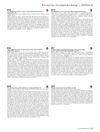 April 2017 in “Journal of Investigative Dermatology”
April 2017 in “Journal of Investigative Dermatology” Stem cells can create hair follicles, potentially treating permanent hair loss, and healthy skin and hair depend on mitochondrial function and special fats.
 December 2016 in “Paleontological Journal”
December 2016 in “Paleontological Journal” Hair growth can be induced by transplanting certain cells, but these cells lose their properties during culturing. The best cell interaction happens in a liquid medium under gravity, and using collagen doesn't help. Future research could focus on using growth factors to stimulate these cells.
 March 2011 in “European Urology Supplements”
March 2011 in “European Urology Supplements” Gene variation affects prostate issues and hair loss.
[object Object] 82 citations,
July 2012 in “Brain pathology” High LGR5 levels in glioblastoma indicate poor prognosis and are essential for cancer stem cell survival.
466 citations,
June 2009 in “Experimental dermatology” We now understand more about what causes acne and this could lead to better, more personalized treatments.
245 citations,
October 2015 in “Nature medicine” Hair follicle-derived IL-7 and IL-15 are crucial for maintaining skin-resident memory T cells and could be targeted for treating skin diseases and lymphoma.
220 citations,
June 2013 in “The Journal of Pathology” Lichen planopilaris may be an autoimmune disease causing hair loss due to immune system issues in hair follicles.
181 citations,
December 2017 in “Trends in immunology” Intestinal intraepithelial lymphocytes are crucial for gut immunity and maintaining the mucosal barrier.
 49 citations,
March 2014 in “Journal of Investigative Dermatology”
49 citations,
March 2014 in “Journal of Investigative Dermatology” Using the drugs AMD3100 and Tacrolimus together greatly improves skin healing and hair growth after a deep skin cut by increasing stem cells in the wound.
21 citations,
November 2015 in “Phytomedicine” Glycyrrhizic acid may help reduce unwanted hair growth.
9 citations,
May 2021 in “BioMed research international” Human hair-derived particles can effectively carry and release the cancer drug Paclitaxel in a pH-sensitive manner, potentially targeting cancer cells while sparing healthy ones.
8 citations,
January 2014 in “PubMed” Researchers made stem cells from human hair follicle cells with better efficiency than from skin cells.
7 citations,
January 2022 in “Biomedicines” Cells from the lower part of hair follicles are a promising, less invasive option for immune system therapies.
3 citations,
December 2019 in “Lupus” Hydroxychloroquine effectively treated a woman's lupus skin issues and hair loss.
 1 citations,
April 2023 in “Frontiers in Immunology”
1 citations,
April 2023 in “Frontiers in Immunology” New treatments for hair loss from alopecia areata may include targeting immune cells, using stem cells, balancing gut bacteria, applying fatty acids, and using JAK inhibitors.
1 citations,
April 2016 in “PubMed” Epidermis and dermis cells together can regenerate hair follicles.
 November 2023 in “International Journal of Pharmaceutics”
November 2023 in “International Journal of Pharmaceutics” New hair loss treatment using marine collagen and dissolvable needles improves hair growth.
353 citations,
July 2015 in “Molecular immunology” Porcine skin is very similar to human skin, making it a useful model for research.
 321 citations,
December 2009 in “Journal of Dermatological Science”
321 citations,
December 2009 in “Journal of Dermatological Science” Dermal cells are key in controlling hair growth and could potentially be used in hair loss treatments, but more research is needed to improve hair regeneration methods.
[object Object] 317 citations,
April 2018 in “Journal of steroid biochemistry and molecular biology/The Journal of steroid biochemistry and molecular biology” PCOS is a complex condition in women that can lead to health issues, and lifestyle changes are the best management approach.
181 citations,
February 2019 in “Cell” Innate lymphoid cells help control skin bacteria by regulating sebaceous glands.
122 citations,
April 2020 in “American Journal Of Pathology” Skin aging is a complex process influenced by various factors, leading to wrinkles and sagging, and should be considered a disease due to its health impacts.
 101 citations,
March 2019 in “Cell Stem Cell”
101 citations,
March 2019 in “Cell Stem Cell” Certain immune cells in the skin release a protein that stops hair growth by keeping hair stem cells inactive.
 54 citations,
January 2023 in “Signal Transduction and Targeted Therapy”
54 citations,
January 2023 in “Signal Transduction and Targeted Therapy” New therapies are being developed that target integrin pathways to treat various diseases.
54 citations,
September 2012 in “The journal of investigative dermatology/Journal of investigative dermatology” Vitamin A affects hair loss and immune response in alopecia areata.
52 citations,
December 2014 in “Journal of Dermatological Science” Apremilast may help treat hair loss in alopecia areata.
 51 citations,
April 2020 in “Cells”
51 citations,
April 2020 in “Cells” Special cell particles from macrophages can help hair grow.
47 citations,
August 2016 in “American Journal Of Pathology” Fibroblast changes in systemic sclerosis may help understand disease severity and treatment.
46 citations,
October 2018 in “JCI insight” CD8+ T cells are involved in alopecia areata and may cause disease relapse.
46 citations,
June 2015 in “American Journal Of Pathology” Diabetes causes lasting cell dysfunctions, leading to serious complications even after blood sugar is controlled.









